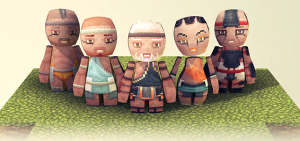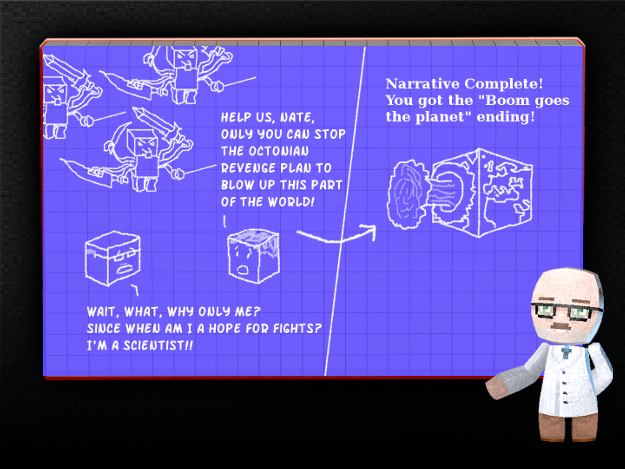
Previously, we have been advertising what we were calling “Catastrophic Events”, however, after internal team discussion, we’ve come to agree that the impression the term was giving was leading people to think “natural disaster” rather than what was intended, which was “longer, further-reaching missions with more plot elements”. Hence, we are re-branding the old Catastrophic Events as “Narrative Elements”.
Epic and Everyday Stories

Narrative elements, to be clear, are not strictly about “disasters”, although disasters might happen if you mismanage (or purposefully exacerbate) the challenges in a narrative element. Narrative elements are basically quests with story-lines added in to give the simulation a little flavor and unique experiences since, let’s face it, quests to find more food or thin out the local shark-bear population get tiresome eventually.
Narrative elements can be the back-stories to dungeons, and the quests that players will undergo in those dungeons. For example, the legend of the alchemist that slowly went mad and booby-trapped her laboratory as her paranoia mounted while she searched for a drug for immortality. Others would pay dearly for the information contained in her notebooks. (And maybe you can swipe some ideas, yourself…)
Others may be strictly social events – a string of corrupt religious leaders prompts a schism in the religion of your culture, with both sides branding the other “heretics”. The player may be forced to pick sides… if you weren’t the one prompting the corruption for this to happen in the first place, just so you could cause civil war that would open the opportunity for invasion.
Or the player accidentally comes into possession of some magic jewelry with a claim of legal jurisdiction over the greater subset of magic jewelry, which that causes insufficient opacity upon equipping, was worn by an ancient not-quite-dead-yet warlord, and can only be disposed of with an in-person factory recall. (Or was that one already done?)
However, Imagine Nations follows the principle that sandbox games shouldn’t force players down a single path to solving the story. “Sequence breaks” are allowed, even if they deflate some of the dramatic impact (or just plain turn the story into a comedy) to just plain shoot the villain before the story gets rolling, or to outright out-villain the villain by doing something even more evil.
Take a look. It’s in a book.
Another reason for the rename to “narrative elements” is that not all narrative elements need actually be “events”.
Let’s say that in a player’s explorations, the player comes across the wreckage of a crashed spaceship. Maybe the player is already at a high technological level, or maybe they’re a cave-person with extremely limited understanding of technology, but that doesn’t matter, the UFO is there, regardless of the player’s character’s ability to comprehend what they’ve found. Inside the UFO might be clues to the identity of the alien race that piloted that ship, and maybe even translatable logs of the pilots. Can the player piece together what happened by reading through the damaged logs? Can the player even piece together where that civilization came from, and find that planet for themselves one day? Will the player try to return the ancient explorers finally back home… or invade their world? Alternately, maybe there’s salvageable or reverse-engineering technology on board, if the player character can make sense of those objects.
This sort of narrative element is not something broadcast by a town crier, or announced by a cut-scene, it’s just a randomly hidden special area to explore, and make sense of, at the player’s own pace, if they choose to explore it at all. Maybe a rumor at the local guild hall or watering hole will give hints, but it’s not something forced front-and-center on the player. Maybe taking the parts found in one crashed UFO, and asking around about missing or damaged parts may lead to finding matching components or rumors of other UFO to find other pieces to cannibalize to recreate alien technology. Rewarding player curiosity when they feel curious, rather than dragging players by the nose, lets players tell the game what sort of quest they want to be on, rather than the game telling the player.
- The Imagine Nations Team
Support the Imagine Nations Crowdfunding Campaign today and earn backer’s access!


will there also be natural disasters?
oops double post.
oops triple post. (how did this even happen?)
Yes, there will be natural disasters, but they aren't the focus of Narrative Elements. You should expect more events that are solvable at a single-character level.